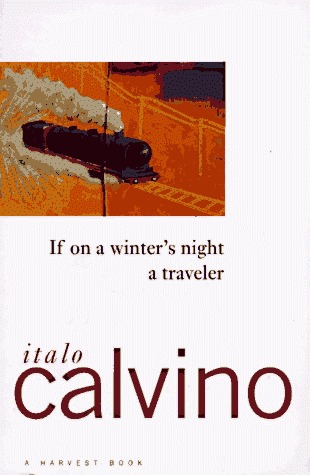If on a Winter's Night a Traveler...by Italo Calvino
Summary from Goodreads:
If on a Winter's Night a Traveler is a marvel of ingenuity, an experimental text that looks longingly back to the great age of narration--"when time no longer seemed stopped and did not yet seem to have exploded." Italo Calvino's novel is in one sense a comedy in which the two protagonists, the Reader and the Other Reader, ultimately end up married, having almost finished If on a Winter's Night a Traveler. In another, it is a tragedy, a reflection on the difficulties of writing and the solitary nature of reading. The Reader buys a fashionable new book, which opens with an exhortation: "Relax. Concentrate. Dispel every other thought. Let the world around you fade." Alas, after 30 or so pages, he discovers that his copy is corrupted, and consists of nothing but the first section, over and over. Returning to the bookshop, he discovers the volume, which he thought was by Calvino, is actually by the Polish writer Bazakbal. Given the choice between the two, he goes for the Pole, as does the Other Reader, Ludmilla. But this copy turns out to be by yet another writer, as does the next, and the next.
The real Calvino intersperses 10 different pastiches--stories of menace, spies, mystery, premonition--with explorations of how and why we read, make meanings, and get our bearings or fail to. Meanwhile the Reader and Ludmilla try to reach, and read, each other. If on a Winter's Night is dazzling, vertiginous, and deeply romantic. "What makes lovemaking and reading resemble each other most is that within both of them times and spaces open, different from measurable time and space.
When I was reading If on a Winter's Night a Traveler, it felt like I was looking at one of those abstract paintings where I say: "Look at those vibrant colors!" "Those juxtaposition of shapes look mesmerizing!" And then when I look underneath the painting, it would say: "Man-Eating Chicken." There is no way that I would be able to interpret that work of art as such. My own interpretation of it wouldn't even come close. And that's how it was with Calvino. He takes you on a whirlwind ride of words and sentences that feels good to read, but I couldn't make heads or tails of it. Take this for example:
“The book I'm looking for,' says the blurred figure, who holds out a volume similar to yours, 'is the one that gives the sense of the world after the end of the world, the sense that the world is the end of everything that there is in the world, that the only thing there is in the world is the end of the world.”
But I did like how Calvino makes reading and writing oh so romantic. And he places people who engage in such activities, in a lofty position. And it feels great because I am one of those people. Second, I quite like the unfinished stories, some of them at least. True, it was frustrating because of the non-existent endings, but I found them quite engaging still. I also appreciated Calvino's inventiveness for coming up with such as crazy and unique format. I like the somewhat mischievous and whimsical quality to it. There is this bit where the narrator, being his usual meta self, starts erasing people and things that he doesn't like, and I instantly grew fond of it because it resembles this particular Looney Tunes episode where a cartoon artist engages with his Bugs and Daffy drawing And I now have a new standard answer to the question: "What superpower would you like to have?" Speaking of superpowers, Calvino put in one last razzle dazzle in the end which I appreciated. Without being spoilery, I am just going to say that a group of things came together, in which I couldn't help but yell "It's Morphin Time!" (Now it looks like I did not get the true meaning of the text no? Haha.)
All in all, I think Calvino put on a great show. Although, I don't think I'll re-read it, still I say it was well worth my time.
If on a Winter's Night a Traveler is a marvel of ingenuity, an experimental text that looks longingly back to the great age of narration--"when time no longer seemed stopped and did not yet seem to have exploded." Italo Calvino's novel is in one sense a comedy in which the two protagonists, the Reader and the Other Reader, ultimately end up married, having almost finished If on a Winter's Night a Traveler. In another, it is a tragedy, a reflection on the difficulties of writing and the solitary nature of reading. The Reader buys a fashionable new book, which opens with an exhortation: "Relax. Concentrate. Dispel every other thought. Let the world around you fade." Alas, after 30 or so pages, he discovers that his copy is corrupted, and consists of nothing but the first section, over and over. Returning to the bookshop, he discovers the volume, which he thought was by Calvino, is actually by the Polish writer Bazakbal. Given the choice between the two, he goes for the Pole, as does the Other Reader, Ludmilla. But this copy turns out to be by yet another writer, as does the next, and the next.
The real Calvino intersperses 10 different pastiches--stories of menace, spies, mystery, premonition--with explorations of how and why we read, make meanings, and get our bearings or fail to. Meanwhile the Reader and Ludmilla try to reach, and read, each other. If on a Winter's Night is dazzling, vertiginous, and deeply romantic. "What makes lovemaking and reading resemble each other most is that within both of them times and spaces open, different from measurable time and space.
When I was reading If on a Winter's Night a Traveler, it felt like I was looking at one of those abstract paintings where I say: "Look at those vibrant colors!" "Those juxtaposition of shapes look mesmerizing!" And then when I look underneath the painting, it would say: "Man-Eating Chicken." There is no way that I would be able to interpret that work of art as such. My own interpretation of it wouldn't even come close. And that's how it was with Calvino. He takes you on a whirlwind ride of words and sentences that feels good to read, but I couldn't make heads or tails of it. Take this for example:
“The book I'm looking for,' says the blurred figure, who holds out a volume similar to yours, 'is the one that gives the sense of the world after the end of the world, the sense that the world is the end of everything that there is in the world, that the only thing there is in the world is the end of the world.”
But I did like how Calvino makes reading and writing oh so romantic. And he places people who engage in such activities, in a lofty position. And it feels great because I am one of those people. Second, I quite like the unfinished stories, some of them at least. True, it was frustrating because of the non-existent endings, but I found them quite engaging still. I also appreciated Calvino's inventiveness for coming up with such as crazy and unique format. I like the somewhat mischievous and whimsical quality to it. There is this bit where the narrator, being his usual meta self, starts erasing people and things that he doesn't like, and I instantly grew fond of it because it resembles this particular Looney Tunes episode where a cartoon artist engages with his Bugs and Daffy drawing And I now have a new standard answer to the question: "What superpower would you like to have?" Speaking of superpowers, Calvino put in one last razzle dazzle in the end which I appreciated. Without being spoilery, I am just going to say that a group of things came together, in which I couldn't help but yell "It's Morphin Time!" (Now it looks like I did not get the true meaning of the text no? Haha.)
All in all, I think Calvino put on a great show. Although, I don't think I'll re-read it, still I say it was well worth my time.




You got me at Morphin Time, hahaha! I had great expectations for this. Perhaps it's why I felt a tad disappointed.
ReplyDeleteAfter the sixth reader saw the list and started reading it, and the phrases were all connected pala, Power Rangers popped into my head, you know the time when they make all their individual Dinozords combine. And a computer voice says Megazord activated! Haha! In my case, I came into this without knowing anything, so I held no expectations.
DeleteHi, Tin!
ReplyDeleteDuring my time reading this, a Man-Eating Chicken would be a great welcome, indeed. :)
Lol! Yeah, that and a hip hop dancing yeti. :)
Delete